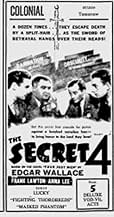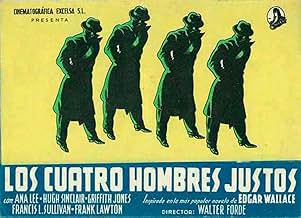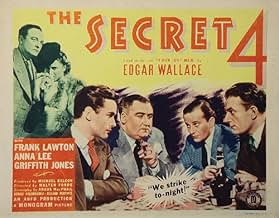Adicionar um enredo no seu idiomaThe four men of the title are British WWI veterans who decide to work secretly against enemies of the country. They aren't above a bit of murder or sabotage to serve their ends, but they con... Ler tudoThe four men of the title are British WWI veterans who decide to work secretly against enemies of the country. They aren't above a bit of murder or sabotage to serve their ends, but they consider themselves to be true patriots.The four men of the title are British WWI veterans who decide to work secretly against enemies of the country. They aren't above a bit of murder or sabotage to serve their ends, but they consider themselves to be true patriots.
- Direção
- Roteiristas
- Artistas
Avaliações em destaque
The four just men of the title are vigilantes, acting outside the law, their identities secret, who have devoted themselves, for reasons never revealed in the film, to fighting crime, tyranny and injustice wherever they find it – mostly in Europe and America apparently. The group is comprised of actor extraordinaire Humphrey Mansfield (Hugh Sinclair), playwright James Brodie (Griffith Jones), Léon Poiccard (Francis L. Sullivan) the successful owner of a exclusive fashion house and foreign correspondent James Terry (Frank Lawton). In the opening sequence, Terry is rescued by his comrades from a Prussian prison where he is moments away from being executed as a spy. Terry escapes with information that a highly placed fifth columnist inside the British government is laying the groundwork for some kind of attack against the United Kingdom. The murder of Myra Hastings (Lydia Sherwood), the wife of a Foreign Office official, leads the Just Men to discover that the Nazi agent is the popular MP Sir Hamar Ryman (Alan Napier) and that the endgame of the enemy plot is nothing less than the invasion and conquest of Great Britain. With only days left until the plan reaches fruition, the race is on to bring down Ryman and save the empire.
The glaring political elements aside, the film plays out like a standard B movie adventure romp. Hugh Sinclair demonstrates he is every bit the actor Mansfield is supposed to be, slipping in and out of characters and disguises with a skill that would leave even Rollin Hand envious. Sullivan is both charming and forceful as the leader of the group and Jones is likable enough as the film's romantic lead, trying to keep eager girl reporter Ann Lodge (Anna Lee) off the track as she edges closer and closer to the truth behind the death of Myra Hastings and the hidden identities of the Four Just Men. Only Lawton is underutilized, his character spending much of the film abroad, and therefore off screen, digging up vital details about the enemy plot.
The film is so obviously an unsubtle warning about the dangers of Nazi appeasement that it cannot escape being labeled as a propaganda film. While the message it champions seems unsurprising today, one must remember that it had only been less than a year since Chamberlain's "peace in our time" speech and that in the United States rules were firmly in place to prevent criticism of Hitler's Germany in Hollywood produced films. But on December 7, 1941 all that would change and Hollywood itself would soon after become the greatest producer of anti Nazi propaganda in the world. Deeming THE FOUR JUST MEN as being "espionage melodrama" is also not inaccurate. But in this too was the film ahead of its time. With the arrival of the Cold War in the 1950s the "espionage melodrama" would come into its own, eventually leading to James Bond and the spy craze of the 1960's.
Never having been released on video or DVD the film is a difficult one to see, but certainly worth the effort if the opportunity arises. It is neither great art, nor great cinema, but it is an entertaining adventure yarn, and a lasting note of a precarious era in modern history.
Walter Forde's bizarre and violent movie is derived from a Edgar Wallace story. Although it looks like a shocker, there were lots of movies in the era that supported the idea of vigilante justice. In the US, the Production Code ended most of those- with the occasional exception of a Gower Gulch producer urging people to rise up and shoot down gangsters. You would think that Britain, with its own censorship,would not permit the production of a movie like this, but the writing was on the wall, and people clearly saw World War Two coming. Even so, it was a near thing. Although there were showings of this in London in June, it didn't go into general release until November, and didn't show in the US until April of 1940, with an epilogue showing goose-stepping Nazi troops and,an appeal to US involvement.
There's an air of constant frustration rather than suspense about the movie, with the four men uncertain of their faltering plans, and Anna Lee's baffled investigation contributing. I think it was a deliberate choice by the film makers, but it makes it more difficult to watch the film.
The film benefits from the presence of other fine British actors. Francis L. Sullivan, an A-1 performer who appeared in the 1940s classics "Oliver Twist and "Great Expectations," has a big part here. The film has good banter between Anna and Griffith Jones; they were also paired in "Young Man's Fancy," that same year. You can tell money was spent on this production: the scenes in Parliament look very authentic, and the exterior of Parliament too. All the sets are very good with a nice 1930's feel. There is a great print of this film on Ealing Studios Rarities Collection, vol. 2. It's pal format, so you'll need a region free DVD player if you're in the USA, like me.
Você sabia?
- CuriosidadesThe film was released only a few weeks before the start of the Second World War. It has been widely perceived that the villainous politician in the story, whom the Four Just Men have targeted, is an archetypal appeaser type, sympathetic to the Nazis and in a war, likely to prove a traitor to Britain. When the film was re-released in 1944, an extended ending was added, featuring overt propaganda elements, including footage of RAF fighters.
- Citações
James Terry: You can't mistake death when you've cheated him for half a year.
- Cenas durante ou pós-créditosOpening credits prologue: Regensberg 1938
Principais escolhas
Detalhes
- Data de lançamento
- País de origem
- Idiomas
- Também conhecido como
- The Secret Four
- Locações de filme
- Ealing Studios, Ealing, Londres, Inglaterra, Reino Unido(studio: made at)
- Empresas de produção
- Consulte mais créditos da empresa na IMDbPro
- Tempo de duração1 hora 25 minutos
- Cor
- Proporção
- 1.37 : 1
Contribua para esta página
































